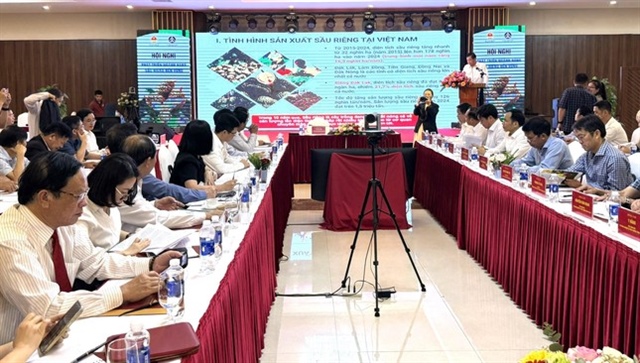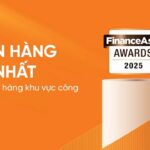On May 24, in Buon Ma Thuot city, the Minister of Agriculture and Environment, Du Do Duc, and the Acting Chairman of the People’s Committee of Dak Lak province, Nguyen Thien Van, co-chaired the conference on “Developing a Sustainable Durian Industry.” The conference took place amid a significant decline in the export volume of this billion-dollar industry.
A staggering increase in durian plantation area
According to statistics, in just under a decade, Vietnam’s durian industry has witnessed remarkable growth in both plantation area and yield. It expanded from 32,000 hectares in 2015 to nearly 180,000 hectares in 2024, a sixfold increase. On average, the area increased by 16,300 hectares per year.
Despite numerous advisories from specialized agencies, the durian plantation area has increased 2.38 times in the past five years compared to the approved development plan for key fruit trees by 2025 and orientations towards 2030.
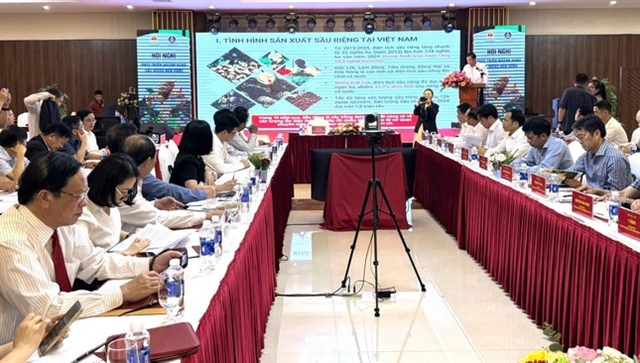
Conference venue. |
The provinces with the largest durian plantation areas in the country include Dak Lak, Tien Giang, Dong Nai, and Dak Nong.
Notably, Vietnam’s durian export market relies predominantly on China. In 2024, a whopping 97.2% of Vietnamese durians were consumed in this billion-people market. This heavy dependence on the Chinese market is the primary cause of fluctuations in Vietnam’s durian export turnover.
Mr. Huynh Tan Dat, Director of the Plant Protection and Cultivation Department, Ministry of Agriculture and Environment, stated that Vietnam remains the second-largest durian supplier to China this year. However, there has been a severe decline of 71.3% in volume and 74% in turnover. As a result, Vietnam’s market share in China decreased from 42.1% to 28.2%.
Enhanced inspection and improved quality
Assessing the Vietnamese durian industry, managers and experts pointed out seven existing shortcomings that need urgent rectification and decisive actions in the coming time for the sustainable development of this billion-dollar industry.
There is a rapid increase in durian production and export volume. The production-consumption chains remain fragmented and lack a clear mechanism. The imbalance between growth and value chain organization poses risks to the industry: technical violations, product returns, and market loss. The technical requirements from importing countries are becoming more stringent, especially regarding heavy metal and prohibited substance (cadmium and Golden Yellow) inspections, necessitating appropriate actions across the entire value chain.
Vietnam lacks stringent regulations to address violations in granting and using region codes and packaging facilities. Consequently, code forgery, code borrowing, and misuse of codes still occur, increasing the risk of product returns, export suspensions, and damage to national reputation.
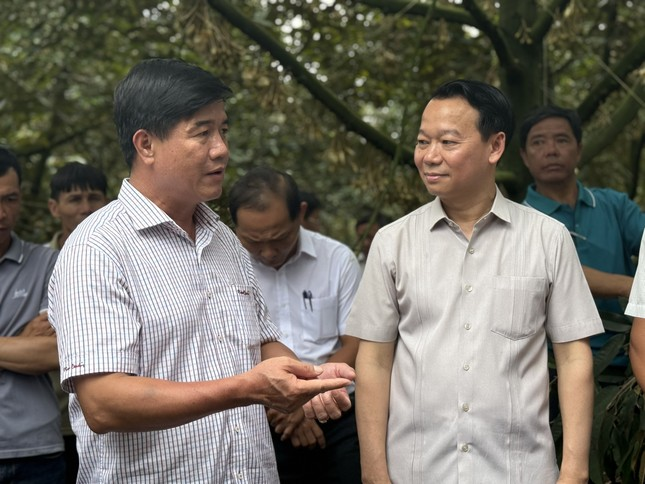 Acting Chairman of the People’s Committee of Dak Lak province, Nguyen Thien Van (on the left), shares information with Minister of Agriculture and Environment, Du Do Duc, during their field trip to the durian growing area in the morning of May 24. |
Ms. Ngo Tuong Vy, CEO of Chanh Thu Fruit Import-Export Joint Stock Group, stated that consumers demand fresh, aesthetically pleasing, and safe durians. That is why durians are dipped in turmeric to disinfect and meet sensory requirements.
“I propose that the Ministry of Agriculture and Environment collaborate with the Ministry of Science and Technology to research and develop a product for preserving durians for export. This is an urgent issue. It is necessary to build a national brand for durian to enhance its competitiveness in the international market,” said Ms. Vy.
For the sustainable development of the durian industry, Acting Chairman of the People’s Committee of Dak Lak province, Nguyen Thien Van, proposed three issues to the Minister of Agriculture and Environment: Issue a mechanism to encourage the production, import of materials, coloring agents, even ripeners, and preservatives for durian as soon as possible. Establish food safety and plant quarantine centers in Dak Lak. Develop a project for high-quality durian, associated with the national brand as directed by the Prime Minister, with Dak Lak as the pilot province.
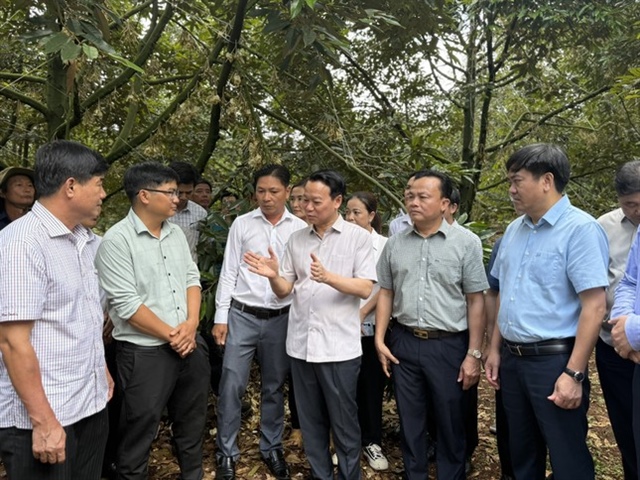 Minister of Agriculture and Environment, Du Do Duc (center), shares information during his field trip to the durian growing area in Dak Lak in the morning of May 24. |
Minister of Agriculture and Environment, Du Do Duc, stated that durian exports still face challenges regarding technical inspections and food safety requirements from importing countries, along with competition and consumption pressures due to rapid production growth. The Ministry of Agriculture and Environment has proposed solutions to improve durian quality, including perfecting regulations on region codes and traceability.
Mr. Duc added that the Ministry of Agriculture and Environment has directed localities to strengthen management and inspection related to region codes and packaging facilities. Moreover, there will be a decentralization of power to local governments in quality management, enhanced inspections, and violation handling to establish a safe and high-quality durian production chain that meets international standards.
Huynh Thuy
– 20:38 24/05/2025
“Nestlé: Committed to Vietnam’s Sustainable Future”
The food manufacturing industry is solidifying its position as one of the pivotal pillars of Vietnam’s processing and manufacturing sector. Alongside its growth trajectory are challenges that businesses must overcome to thrive.
“The Banking Sector’s Early Embrace of Green Credit: Scaling Up and Accelerating Sustainable Lending”
On May 21, 2025, the State Bank of Vietnam (SBV) hosted a seminar to promote the implementation of the banking sector’s Action Plan for the National Green Growth Strategy for the period of 2021-2030. The event also witnessed the launch of the “Handbook of Environmental and Social Risk Management System in Credit Activities”. Mr. Dao Minh Tu, SBV’s Permanent Vice Governor, attended and chaired the seminar.
“FinanceAsia: SHB is Vietnam’s ‘Best Bank for Public Sector Clients’ in 2025”
Within the prestigious FinanceAsia Awards 2025, the Saigon-Hanoi Commercial Joint Stock Bank (SHB) has been recognized as the “Best Bank for Public Sector Clients” in Vietnam. This esteemed accolade celebrates SHB’s unwavering dedication to offering comprehensive and efficient financial solutions to public sector entities, standing as a testament to their commitment to fostering the country’s sustainable development.
Leaving Behind ‘Eradicating Hunger and Poverty’, It’s Time for the Nation to Race Towards Prosperity
Initiating a nationwide movement for a competitive and prosperous society is about unleashing everyone’s potential and igniting a spirit of healthy competition and economic development.

